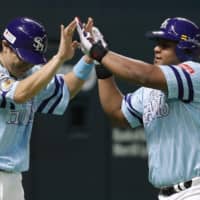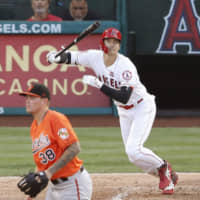Ofunato High School was inundated with calls after its loss in the final of the Iwate Prefectural tournament on Thursday.
But it wasn’t a stream of commiserations and condolences pouring in — there were around 150 calls on the day of the school’s 12-2 loss to Hanamaki Higashi High School according to multiple outlets. It was people asking why Roki Sasaki, Ofunato’s fireballing ace, didn’t pitch in the final with a spot in the National High School Baseball Championship on the line.
Never mind that Sasaki had thrown 435 pitches from July 16-24. Or that he would’ve pitched in the final on no rest after throwing 129 pitches in the semifinals and 194 — with 21 strikeouts and a game-winning two-run homer — over 12 innings three days before that.
For many, all that mattered was reaching Koshien and the cost of admission was to be paid by an 18-year-old’s right arm. Instead, Ofunato manager Yohei Kokubo, acting with rare caution this time of year, rested his pitcher. Sasaki reportedly had some elbow discomfort, though the school has denied this.
That this has caused controversy shows Japan still has a long way to go toward changing the attitudes about the health of young star pitchers.
Sasaki has a fastball that was clocked at 163 kph (101 mph) by a scout in April and hit 160 (99.4) during his 194-pitch outing. He’s a star already being compared to Shohei Ohtani. Of course everyone wanted to see him pitch, but it’s refreshing to see his health ultimately held in higher regard than one (really important) game.
“It’s a bit surprising he didn’t start the game, but if he was hurt in some way, it makes the decision not to start him easier (even if this may have been Ofunato’s biggest chance to get to Koshien),” Edwin Dizon, whose website (eigokokoyakyu.wordpress.com) is among the few English sources of information about Japanese high school baseball, told The Japan Times.
“The only question then was, could the kantoku (manager) have managed Sasaki better? Maybe relieve him in that extra-inning game vs. (Morioka Daishi) so he didn’t throw 194 pitches? Either way you look at it, the kantoku (to some extent) was looking out for Sasaki.”
More managers should.
The problem is the romanticized image of the high school ace (especially one from a non-powerhouse) on the way to and during Koshien. If he carries his team to victory, he’s hailed as a national hero. A valiant effort in defeat (think Kanaashi Nogyo’s Kosei Yoshida last year) is celebrated just as rapturously — so long as enough of the player’s body was dutifully offered up as sacrifice.
“For me, it’s one of the most disappointing things recently in the sports world,” former NPB great Isao Harimoto said about Sasaki not pitching during his weekly television appearance on TBS, according to Nikkan Sports.
It’s this attitude that must change.
Luckily, the issue of overburdening young pitchers doesn’t seem to be going away. Niigata Prefecture injected new life into the debate in December by announcing a pitch limit for its spring tournament. Though it remains under review after discussions with the Japan High School Baseball Federation, which has vowed to study the issue.
On Saturday, Cubs pitcher Yu Darvish railed against this aspect of Japan’s high school culture.
“In my opinion, those people who say things like asking why he (Sasaki) didn’t pitch are not giving a single thought to the kids,” Darvish told Kyodo News.
Earlier on Twitter, Darvish said the start of prefectural tournaments should be moved back to May.
Logistics aside, spreading the prefectural games out would let teams lean on their aces, but with the pitchers getting enough rest between starts. Though it would be hard to do at Koshien itself.
What’s harder to address is smaller programs putting everything on one star pitcher. A powerhouse with a supply of star players, like last year’s summer champ Osaka Toin, doesn’t have to rely on just one. Meanwhile Kanaashi Nogyo (Akita Prefecture) needed Yoshida to throw 881 pitches — from Aug. 8-21 — to help carry it to the 2018 final.
“I don’t see any way for a non-powerhouse school to compete without an ace they can run out there like old days,” Dizon said. “Powerhouse teams have better talent, and now better depth that I think they will begin using more.
“Like the only option that could be had is to basically develop a poor man’s powerhouse pitching staff. And just throw pitchers out there during a game to see who sticks. Develop pitchers with different arm angles. Different offspeed pitches.”
Given the reaction to Sasaki sitting out, real change will probably only come en masse via rule changes — which competitively will benefit schools with depth.
It’s encouraging, though, that not everyone is set in the old ways.
“If you could ask Shenron (the wish-granting dragon from the “Dragon Ball” series) to grant one wish, ask for this corner to disappear,” Darvish tweeted in response to the comments Harimoto made during his TV segment.
Source : Baseball – The Japan Times


